Key takeaways:
- Breaking news often prioritizes speed over depth, leading to emotions like fear and anxiety; it’s important to take a step back and seek comprehensive information.
- Managing anxiety from news involves setting boundaries for consumption and finding constructive outlets, such as discussing with friends or journaling.
- Building resilience to negative news can be fostered through gratitude practices and community engagement, transforming feelings of helplessness into empowerment.
- Creating a positive news environment involves curating uplifting sources and having meaningful discussions, which can enhance emotional well-being.
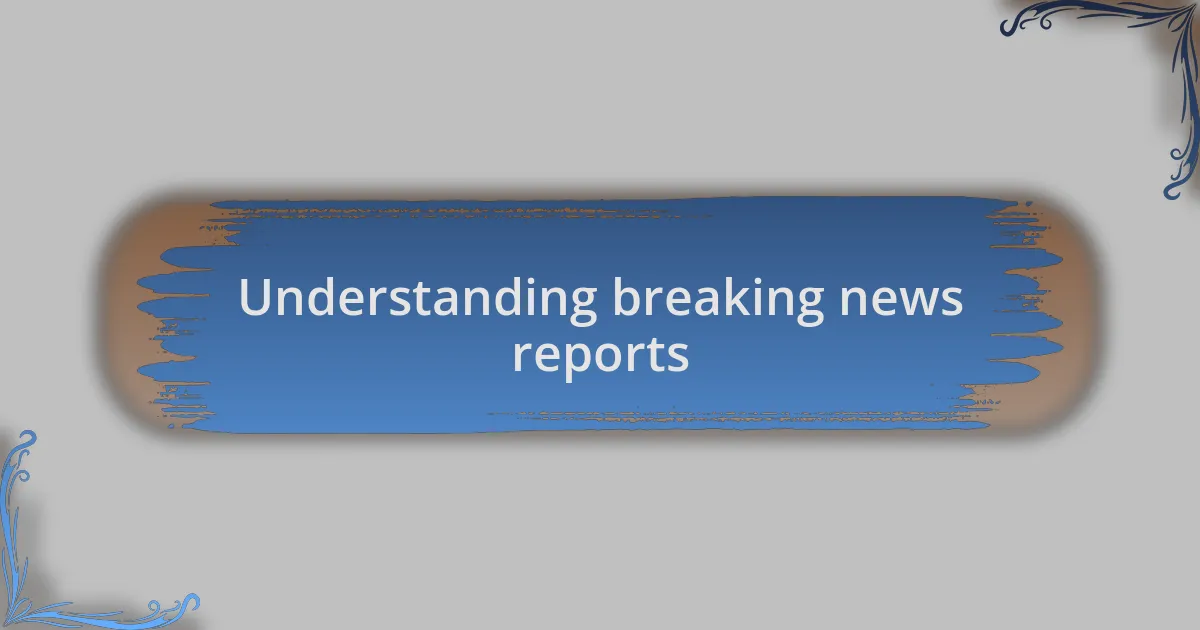
Understanding breaking news reports
Breaking news reports are designed to capture our attention, often delivering urgent information that can provoke intense emotions. I remember the day of a major natural disaster when the news unfolded rapidly. The images on my screen were both captivating and terrifying, reminding me how the immediacy of breaking news can send our minds racing with fear and uncertainty.
These reports are often presented in a fragmented manner, prioritizing speed over depth. Have you ever found yourself overwhelmed by the sheer amount of information, wondering what is true amidst the chaos? I’ve been there, scrolling through stories that blend sensationalism with factual updates, leaving me questioning the reliability of what I was consuming.
Understanding that breaking news can sometimes lack context is crucial. It’s easy to fall into a cycle of anxiety, especially when a headline triggers a personal fear or concern. I recall watching a segment about a health crisis and immediately thinking of loved ones. It struck me then how imperative it is to take a step back, assess the facts, and seek out comprehensive information rather than getting swept away by momentary panic.
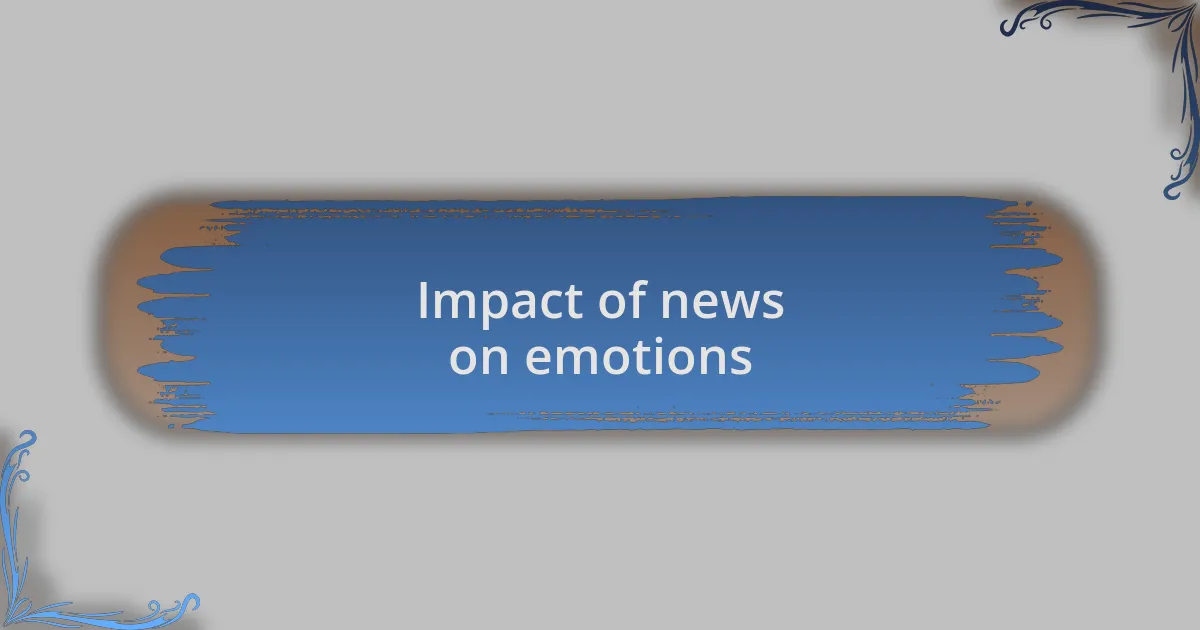
Impact of news on emotions
The impact of news on our emotions can be profound. I still remember the evening when a breaking news report flashed about a violent incident in my city. My heart raced as fear seeped in, making me question my own safety and that of my friends. Have you ever felt that knot in your stomach from a headline that hits too close to home? It’s that visceral reaction that reminds us how connected we are to the world around us.
Moreover, the continuous flow of alarming news can lead to emotional fatigue. I found myself glued to the TV during a recent election cycle, absorbing every bit of coverage and analysis. But soon, I felt drained—the constant barrage of distressing headlines made me feel helpless and anxious. It really made me wonder, how much of this should we allow into our lives without impacting our mental health?
It’s also interesting how news impacts different people in varying ways. For instance, after a terrifying global event, I found solace in connecting with friends to discuss our feelings. I noticed that some of them reacted with anger, while others felt deep sadness. This variation highlights the importance of acknowledging emotions brought on by news. Isn’t it fascinating how our individual experiences shape our responses to what we see in the media?
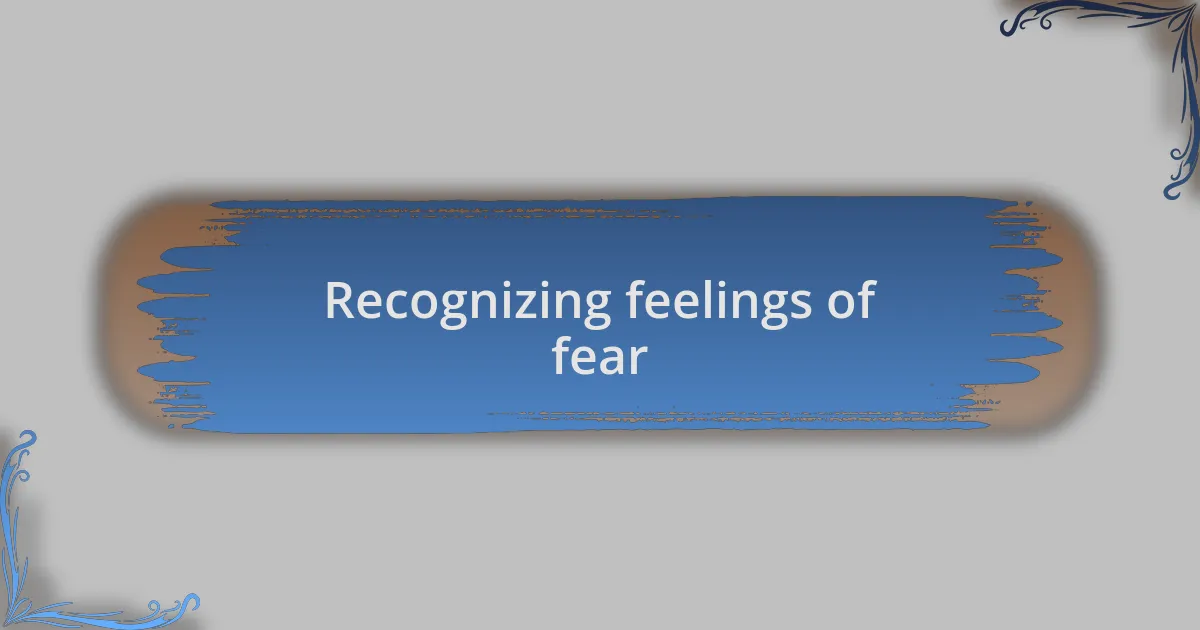
Recognizing feelings of fear
Recognizing feelings of fear can be the first step in managing emotional responses to the news. I recall logging onto social media and coming across unsettling reports about a natural disaster in a part of the world I had once visited. My heart sank, and I felt a flutter of panic—those images made the situation feel personal, even if I wasn’t directly affected. Have you ever felt that rush of anxiety when you realize the world can change in an instant?
That initial surge of fear often stems from our instinct to protect ourselves and our loved ones. I remember chatting with a friend after hearing about an unsettling news story that could impact our community. We both voiced our concerns, expressing how helpless we felt—those moments of vulnerability can be eye-opening. It really made me think about how important it is to validate those feelings instead of brushing them off as mere reactions to the headlines.
Sometimes, it’s easier to ignore those feelings, suppressing them beneath a facade of indifference. I’ve tried that, only to find those emotions creeping back during quiet moments, reminding me that I’ve buried real fear and anxiety. This reflection has pushed me to recognize and confront those feelings head-on. Have you considered how your body reacts to distressing news? Paying attention to those physical signals can make a world of difference in understanding your emotional landscape.
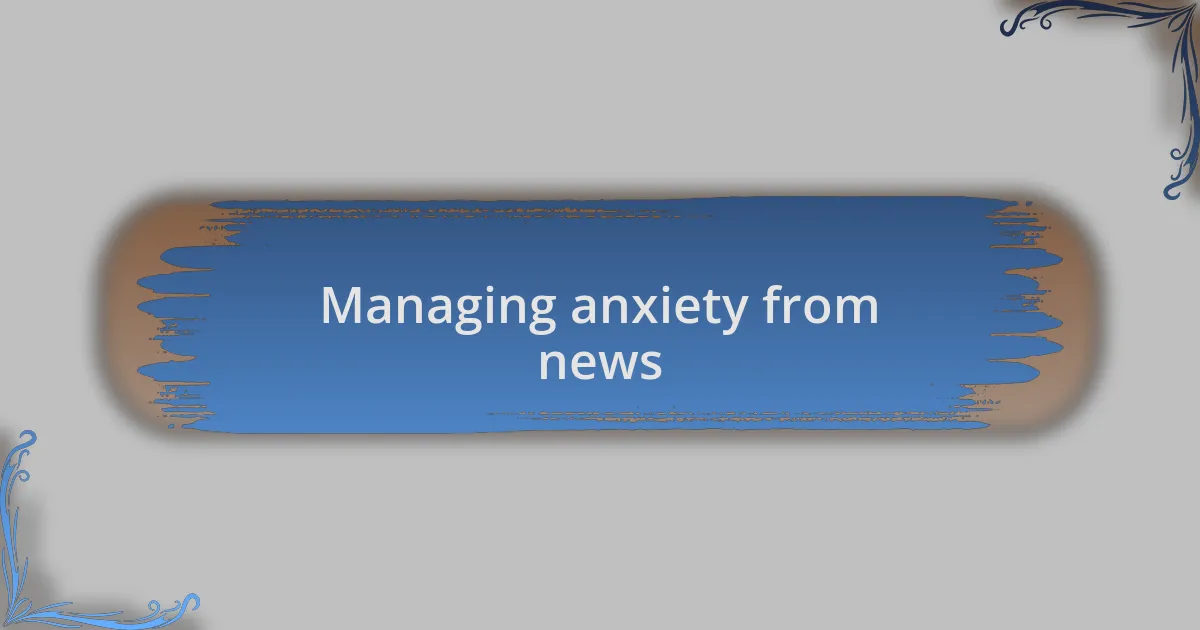
Managing anxiety from news
Managing anxiety from consuming news can feel like navigating a turbulent sea. I remember a particularly harrowing week when multiple crises unfolded, and I found myself refreshing news apps constantly. Each notification spiked my heart rate, making me realize that sometimes, stepping away is not just an option but a necessity. Have you ever noticed how breaking news can hijack your mental space, leaving little room for anything else?
One effective strategy I’ve discovered is setting boundaries around news consumption. I’ve adopted a routine where I check updates only at specific times during the day, allowing me to process information without feeling overwhelmed. During those designated times, I focus on quality sources that provide context rather than sensationalized headlines. Isn’t it interesting how a simple change in our approach can ease the weight of what we absorb?
Ultimately, managing anxiety from news involves acknowledging our emotional responses while finding constructive outlets. I often find relief in discussing troubling news with friends or journaling my thoughts, which helps to clarify my feelings and reduce their intensity. Have you ever tried articulating your worries? Talking about them can create a sense of shared understanding, reminding us that we’re not alone in this chaotic information age.
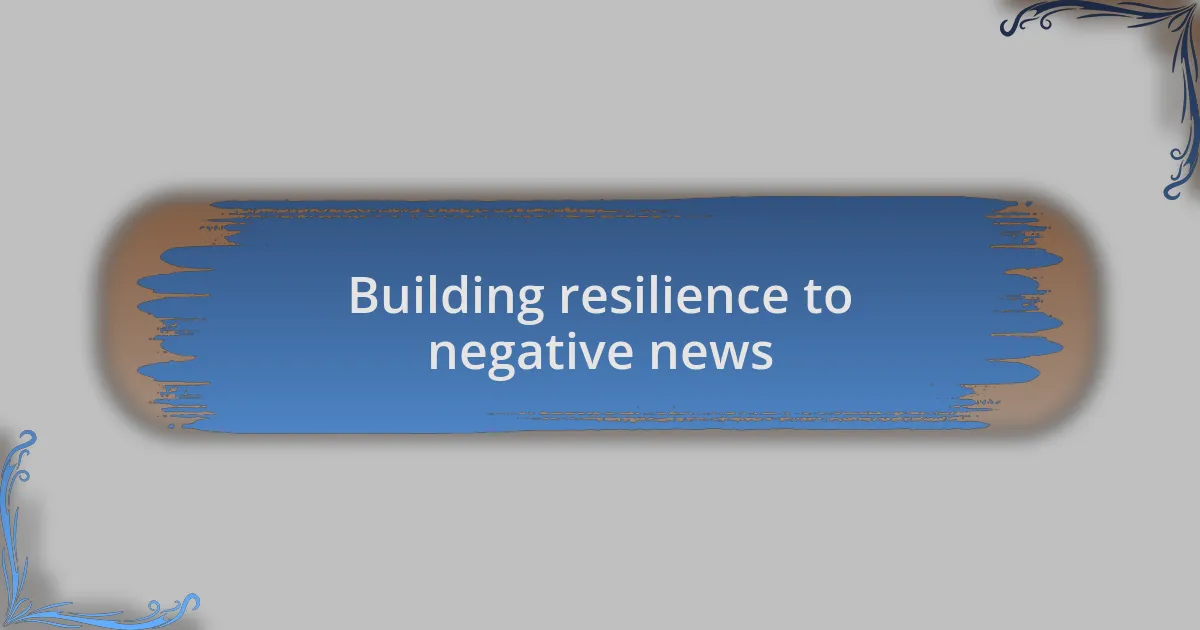
Building resilience to negative news
Building resilience to negative news requires a proactive approach. I vividly recall a time when I felt completely weighed down by incessant reports of global crises. It hit me one evening as I scrolled through my feed—each headline felt like a personal wound. I wondered how I could transform that vulnerability into strength. By recognizing this emotional impact, I started to cultivate a mindset that acknowledges fear as a natural response rather than a permanent state.
One practice that I’ve found particularly helpful is focusing on gratitude amidst the chaos. I made it a habit to jot down three things I’m thankful for each day. This small act reminded me that despite the heavy headlines, positive stories and experiences still existed around me. Have you ever stopped to appreciate the everyday moments that bring light? It’s in those reflections that I found resilience growing quietly, counterbalancing the negativity I encountered online.
Lastly, connecting with my community has been a game changer. I’ve engaged in local initiatives that focus on positive change inspired by the negative news I initially consumed. It’s incredible how channeling that energy into action can create a sense of empowerment. Have you ever tried volunteering or participating in local issues? Taking meaningful steps beyond just consumption transformed my experience from feeling helpless to feeling hopeful, reinforcing my resilience against the weight of negative news.
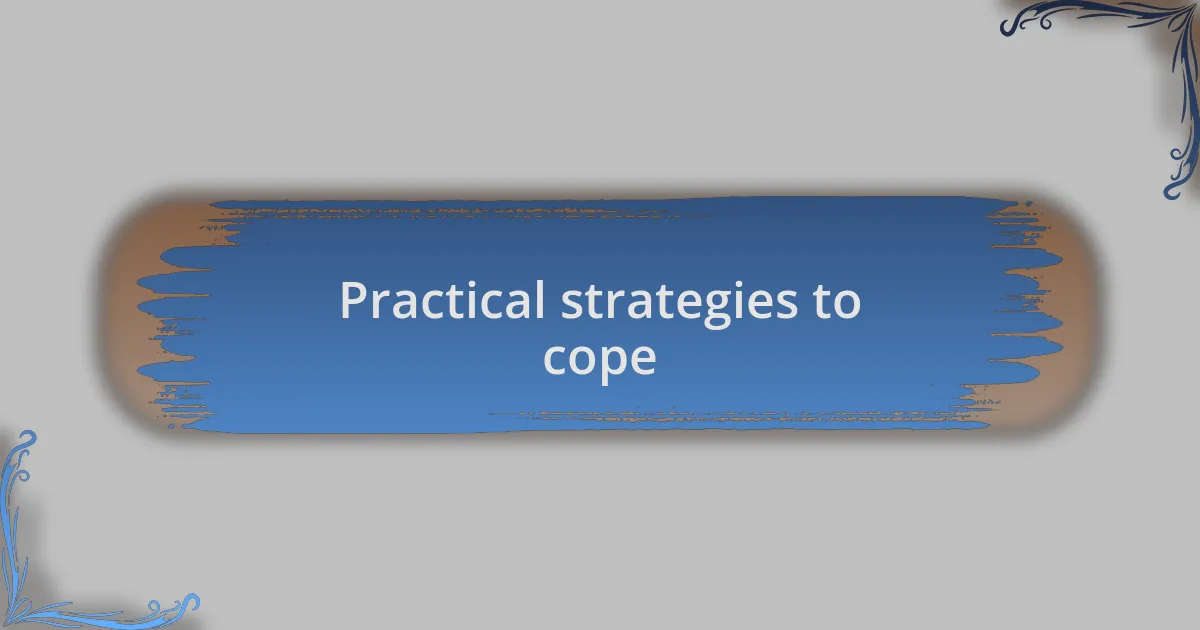
Practical strategies to cope
One effective strategy I’ve discovered is setting clear boundaries around news consumption. For a while, I found myself checking the news incessantly, like a moth to a flame. I realized this habit only heightened my anxiety. Now, I limit my news intake to specific times each day. This practice helps me maintain a sense of control while still staying informed. Have you ever considered how moderation could change the way you feel about current events?
Engaging in physical activity has also proven to be a powerful antidote to fear stemming from news reports. I remember one particularly tough week when global events dominated my thoughts. I decided to take a long walk in nature. As I moved, I felt my mind gradually clear, allowing me to process my emotions in a healthier way. Physical activity not only alleviates stress but also fosters a sense of connectedness with the world around me. What activities do you find grounding?
Lastly, I’ve turned to creative outlets as a way to cope with distressing news. For me, journaling about my feelings during periods of heightened anxiety has been therapeutic. It’s fascinating how putting pen to paper can transform chaotic thoughts into coherent insights. I often wonder: have you explored any creative avenues to express your fears? Finding a medium that resonates with you can be incredibly liberating, facilitating a deeper understanding of your emotions and building resilience.
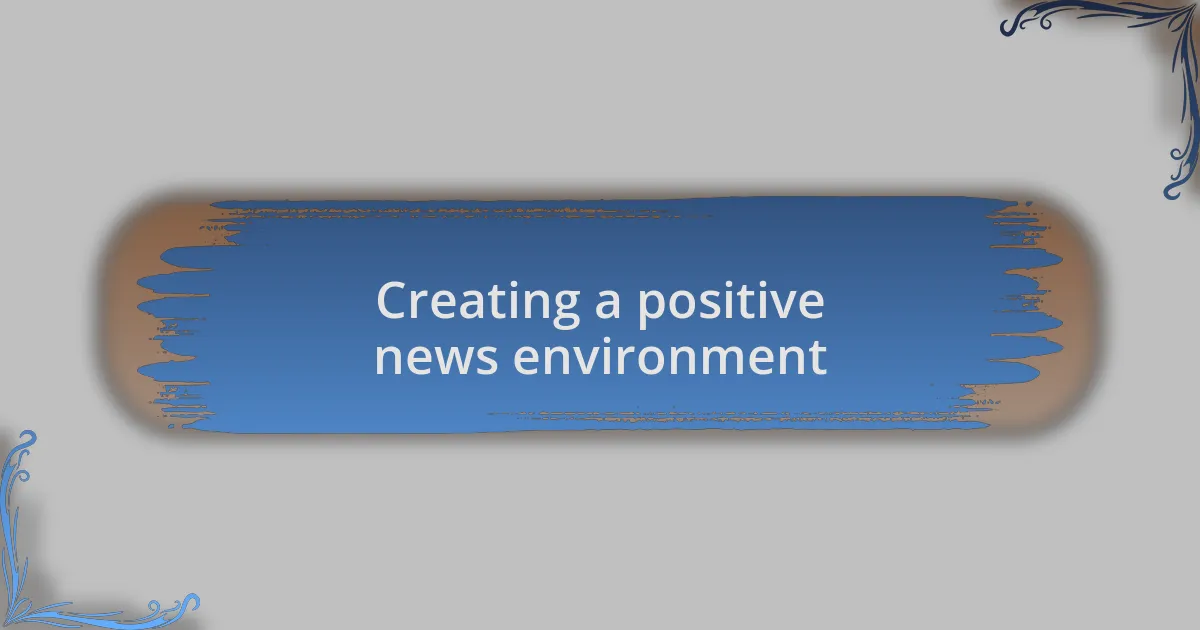
Creating a positive news environment
Creating a positive news environment begins with curating the sources we rely on for information. I remember a time when I stumbled upon an uplifting news platform that focused exclusively on positive stories. The shift in my mood was immediate; I felt lighter and more hopeful about what was happening in the world. Have you thought about how the sources you choose can influence your emotional well-being?
Another key aspect is fostering meaningful conversations around news topics. I often have discussions with friends about uplifting stories or community initiatives that inspire change. These conversations create a shared sense of hope and remind me that, amidst chaos, there are individuals making a positive impact. How do your discussions shape your perspective on the news?
Lastly, I believe it’s essential to practice gratitude when consuming news, even when it focuses on challenging topics. One evening, instead of feeling overwhelmed by negative headlines, I made a list of things I was thankful for that day. This simple action helped shift my focus, allowing me to acknowledge the good alongside the bad. Have you tried integrating gratitude into your news routine to cultivate a more positive outlook?